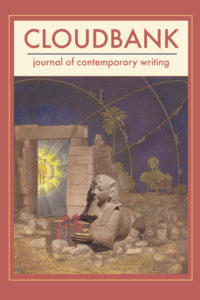Cloudbank 11

Cloudbank 11 includes poetry by Lisa Lewis, Bill Brown, Andrea Hollander, D.G. Geis, Thomas Mitchell, Peter Schmitt, Kim Kent, and many others. Overland Park by Michael Malan, Towline by Holly Karapetkova, and Star Journal: Selected Poems by Christopher Buckley are reviewed.
PRIZE-WINNING POEM
Walking along the Beach, High on Mushrooms, Christmas Day
by Kim Kent
Because that week a boy had lied to me, I would have tried anything
to let my mind take a walk along the water, wander
the dirt bluff trails free of anger or sadness, or the lingering
ghosts of his hands along my skin. Just a little dose,
the instructions said, for a good time. My friend and I,
side-by-side, stared out at the water, almost purple, moving
like a perfect sheet of glass. Behind us a father and son
watched a bald eagle atop a high bough and all of us stared
amazed by different things. I knew then, that this was it.
The great beauty no one else was seeing and the body alive
to itself: the vivid pulse of blood in my hands, the steps
we took floating, one after the other, with almost no
effort at all, the dark shadows of trees inked into place.
And after what was either no time or hours, we walked
back towards her car. The path getting darker and the sky
above the water pink, then blue, then purple. And then,
rounding the last curve, the whole sea appeared
below us as if we’d pulled back a curtain on a picture
window. The city in the distance twinkling, and the ferryboats
lit up, crossing paths like two mouths touching
and then, pulling apart. Everyone must have been out there.
Heading home or getting where they were going. We
watched until our eyes glowed with the dark, kept watch
for what we could no longer see clearly in the distance.
Poets and writers in Cloudbank 11
Bobby Steve Baker
Paula Brancato
Bill Brown
Christopher Buckley
Susana H. Case
Noel Conneely
Jim Daniels
Carol Ellis
Alan Elyshevitz
Michael Findlay
Diane Frank
D.G. Geis
Stephen Gibson
Ryan Guth
Soramimi Hanarejima
John Harn
Andrea Hollander
Rob Jacques
Rich H. Kenney, Jr.
Kim Kent
Tom Lane
Lisa Lewis
Sue Fagalde Lick
Gary Metheny
D. C. Miller
Thomas Mitchell
Susan Bucci Mockler
Anne Randolph
Tiah Lindner Raphael
Sherry Rind
Richard Robbins
Sheila Sanderson
Claire Scott
Elaine M. Seaman
Peter Schmitt
Mark Smith
William Snyder
David Spiering
Alina Stefanescu
Mark Terrill
Robert Tremmel
Gail Tyson
James Valvis
Marty Walsh
Francine Witte
Robert Wynne
Gary Young
Jake Young
Yanwen Xu
